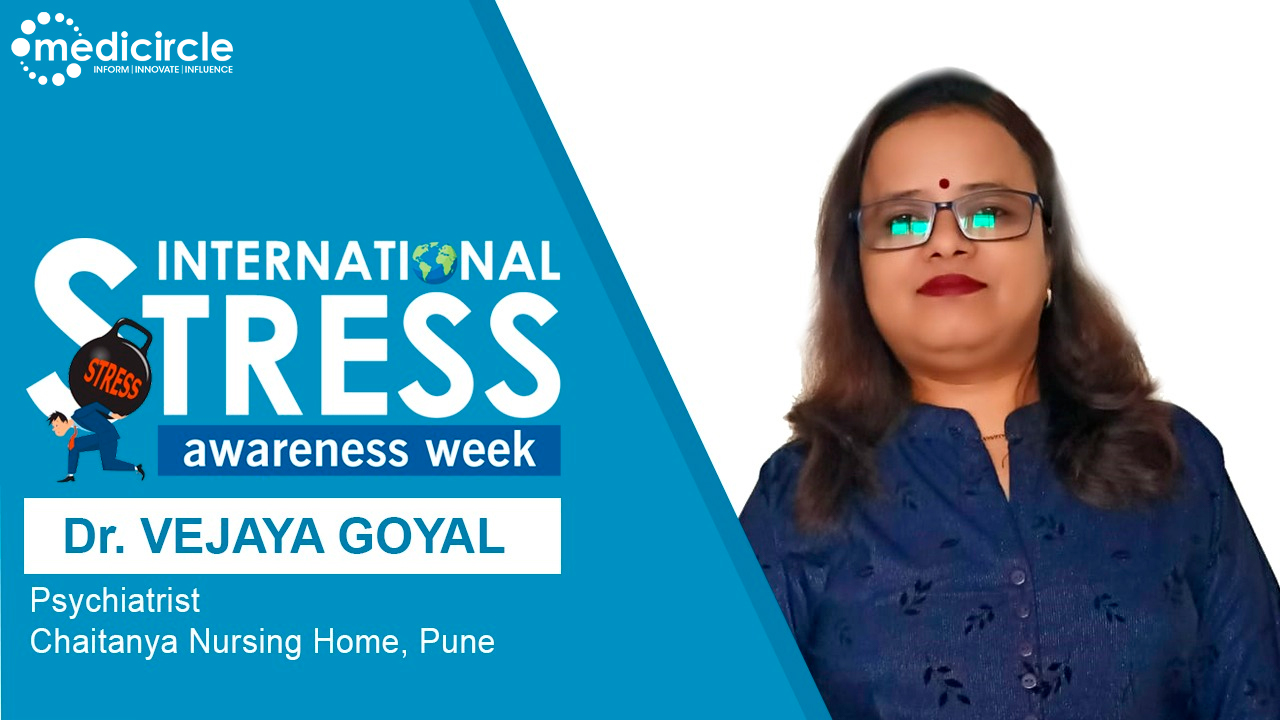International Stress Awareness Week is celebrated every first week in the month of November to raise awareness of the challenges and burdens associated with dealing with stress daily. The day was launched by the International Stress Management Association. Many people across the world have gone through tough times due to the COVID-19 outbreak.
Even before the pandemic, India was labeled as the most stressed country. Where the global average of stress is 86%, 89% of Indians suffered from stress in 2019. That is 9 in every 10 people suffer from stress.
On the occasion of International Stress Awareness Week, we at Medicircle are conducting an exclusive awareness series wherein we will be featuring experts in this field to understand and create more awareness about the effects of stress.
Dr. Vejaya Goyal is a psychiatrist at Chaitanya Nursing Home. She has more than 15 + years of experience in this field. She deals with cases of depression, anxiety management, addiction, and mood disorders in adults. She also has membership in the Indian Psychiatric Society.
All you need to know about stress
Dr Vejaya Goyal says, “Our ancestors evolved over a period of time which is called evolution. We have learned to deal with stress right from staying in the jungle to tall buildings. We learned to adjust to the situation and also learned to escape as per our basic necessities - which are food, clothing, and shelter. Our ancestors were always in the “high alert stage” just like our army. This high alert response to the body is called stress. This can be external and internal in day-to-day life. Stress is the response of our body to external and internal changes. Diseases like diabetes and blood pressure also cause stress.
Stress is important for our body which helps us to adapt to situations that are very necessary for our life. This is an acute or chronic response which is fight - flight or freeze of our body. This is an immediate response to stressors through release of neurotransmitters and chemicals in the brain. If the external and internal response can be prolonged leading to chronic stress. This stress can affect all age groups. This stress can have negative effects on coping skills and adaptation of the body which causes chronic stress. Children, teen, early adults and elderly are suffering from stress.”
Stressors in children
Dr. Vejaya Goyal says, “Even children are going through stress which can have various factors like -
Stress at home Peer pressure School tension
There are many stressors in different age groups with different manifestations. It is important to note the following points in children to deal with stress -
Identify the cause Evaluate the stress levels Burden of stress Check for change in behavior Chronic sadness for weeks Changes in weight Changes in appetite Changes in academic performance Changes in social activities Staying lonely Bedwetting in children Nail-biting Nose picking Hair twirling or picking Pinching on skin Overactive children Tantrums and anger in children Sudden changes in teenagers Mood swings due to hormonal balances Transferring stress from others like from parents to children
Every parent should understand that kids can pass through stress. Acceptance of parents for child stress should be taken care of. ”
Responsibility of parents in case of stressful child
Dr. Vejaya Goyal says, “Every parent has certain responsibility and duties towards the stressful child which are as follows-
Be with your child Talk to your child Encourage them to share your stress Use funny elements to emotion Reduce anger and anxiety Try to play with kids Trust Acceptance of their emotions Understand the existence of basic emotions Change your perspective towards situations Tell children to express their feelings and emotions Explain to them to love them as you are."
Stress in teenagers and early adults
Dr. Vejaya Goyal says, “There are many psychosocial and economic factors in early adulthood particularly in the age group of 20 - 30 like -
Academic stress Job interview stress Business stress Parental expectation Self-expectation Social media and tv impact Relationship issues and pressure Realistic view and fantasizing view Peer pressure Financial stress Identity stress
The age group of 20- 30 is the most sensitive to stress.”
Mental stress and well being
Dr. Vejaya Goyal says, “Stress impacts each and every part of the body. We are born with certain behavioral traits which cannot be changed. The physical attributes and personality traits can be changed however we can learn how to cope with stress. The most simple and ideal way to deal with stress is to deal with situations. Stress can affect -
Sugar levels Blood pressure Heart problems Cholesterol levels Cancer problems Induce illness Panic attacks Anxiety Adjustment issues.”
Control stress positively
Dr. Vejaya Goyal says, “The tips to control stress are -
Acceptance of stress which is unavoidable Cope with stress positively We cannot change circumstances around you Deal with situation Say “I can” Avoid “What if” and replace it with “So what” Sound sleep Exercise Balanced diet Stress is normal so stay positive Breathing technique Increase stress awareness with 5 senses, eyes, ears, nose, skin, and breathe Aromatherapy Watch nature colors and beauty Listen to soft music Thought stopping."
(Edited by Dr.Rati Parwani)

 Dr Vejaya Goyal gives some information about how to deal with stress positively using your five senses and some related techniques which are a must in our life. This is a truly must-watch video that can change your perspective towards stress and bring on a positive attitude to cope up and defeat stress today.
Dr Vejaya Goyal gives some information about how to deal with stress positively using your five senses and some related techniques which are a must in our life. This is a truly must-watch video that can change your perspective towards stress and bring on a positive attitude to cope up and defeat stress today.





.jpeg)
.jpeg)
.jpeg)
.jpeg)
_(1)_(1)_(1).jpeg)
_(1).jpeg)
.jpeg)


.jpeg)





.jpeg)

.jpeg)

.jpeg)
.jpeg)

.jpeg)




